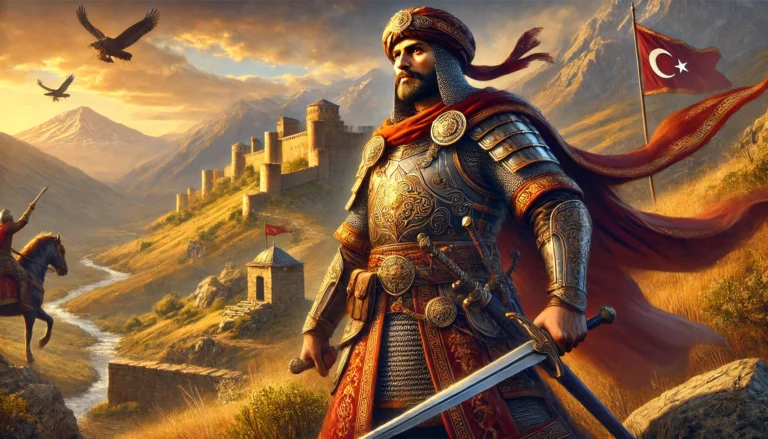Aykut Alp is one of the unsung heroes of early Ottoman history, embodying the valor, strategic brilliance, and loyalty that defined the rise of the Ottoman Empire. A trusted companion of Osman I, the founder of the empire, early Ottoman leader played a pivotal role in key military campaigns and the administration of newly conquered territories. His contributions helped transform the Ottoman principality from a modest frontier state into a growing power in Anatolia.
-
A Life Shaped by the Anatolian Frontier
Aykut Alp’s story begins in the rugged frontier of 13th-century Anatolia, a region where Byzantine and Turkish forces regularly clashed for dominance. This volatile environment demanded resilience and martial skills from its inhabitants, and Aykut Alp was no exception. Born into a culture steeped in the traditions of the Ghazi warriors, Aykut Alp grew up witnessing the struggles and triumphs of those dedicated to expanding and protecting the Islamic realm.
The title “Alp,” meaning “hero” or “brave” in Turkish, signifies his prowess as a warrior and his unwavering dedication to the cause. Historical records suggest that Aykut Alp was among the first to recognize Osman I’s leadership potential. Drawn to Osman’s vision of unity and justice, Aykut Alp aligned himself with the budding Ottoman state, committing his life to its growth and stability.
Aykut Alp’s early life remains shrouded in mystery, but his reputation as a skilled and fearless fighter quickly spread throughout the frontier. His loyalty to Osman I was more than an alliance; it was a partnership rooted in shared values and a mutual desire to bring peace and prosperity to a fractured region.
-
Aykut Alp’s Role in the Ottoman Expansion
The rise of the Ottoman Empire would have been impossible without the contributions of warriors like Aykut Alp. He played a crucial role in several key battles that shaped the destiny of the fledgling state. One of his earliest notable achievements was his participation in the Battle of Domaniç (1287), where Ottoman forces secured a decisive victory against the Byzantines. This triumph was a turning point in establishing Ottoman dominance in northwest Anatolia.
Aykut Alp also played a significant role in the siege and capture of Yar Hisar and Bilecik, two vital Byzantine strongholds. His strategic insight and mastery of guerrilla tactics allowed the Ottoman forces to outmaneuver their opponents, securing these territories with minimal casualties. These victories not only expanded Ottoman territory but also demonstrated the effectiveness of Osman’s leadership and Aykut Alp’s military genius.In addition to major battles, Aykut Alp participated in numerous smaller skirmishes and raids that helped fortify Ottoman positions along the frontier. His ability to lead troops with courage and precision made him one of Osman I’s most trusted commanders.
-
Leadership Beyond the Battlefield
Aykut Alp’s contributions extended far beyond his martial skills. He was deeply involved in the governance of newly conquered territories, ensuring smooth transitions from Byzantine to Ottoman rule. His ability to foster harmony among diverse populations—Muslim, Christian, and others—was instrumental in maintaining stability in the early Ottoman state.
Aykut Alp’s approach to leadership was marked by fairness and pragmatism. He understood the importance of winning hearts and minds, often working to integrate local communities into the Ottoman fold with minimal resistance. This inclusivity became a hallmark of early Ottoman governance, setting the stage for the empire’s enduring success.
As an administrator, Aykut Alp demonstrated exceptional foresight. He worked to establish systems that ensured economic stability and security in the regions under his care. His efforts contributed to the burgeoning state’s ability to sustain itself and expand further into Anatolia and beyond.
-
Key Qualities That Defined legendary warrior
Aykut Alp was a man of remarkable character, and his qualities set him apart as a leader and warrior. Foremost among these was his unwavering loyalty to Osman I. In an era rife with shifting allegiances, Aykut Alp remained steadfast in his commitment to the Ottoman cause, even during the most challenging times.
His strategic brilliance was another defining trait. Aykut Alp had an exceptional ability to assess complex battlefield situations and devise tactics that capitalized on the strengths of his troops while exploiting the weaknesses of his enemies. His role in securing key victories demonstrated not only his combat prowess but also his deep understanding of military strategy.
Lastly, Aykut Alp’s vision for unity and inclusivity made him a key figure in Ottoman governance. He saw the potential of a unified state that transcended ethnic and religious divides, and he worked tirelessly to make this vision a reality. These qualities ensured that his influence endured long after his time.
-
Legacy and Historical Significance
While Aykut Alp may not be as widely recognized as Osman I or Orhan Gazi I, his contributions were foundational to the early Ottoman state. His victories in battle and his efforts in governance helped secure the survival and growth of the empire during its most vulnerable period. Aykut Alp’s life is a testament to the importance of loyalty, courage, and foresight in shaping history.
The values Aykut Alp upheld—justice, inclusivity, and service—resonated throughout the Ottoman Empire’s history. His actions set a precedent for the Ghazi ethos that would define the Ottoman military for centuries to come. He demonstrated that true leadership is not only about winning battles but also about building a just and sustainable society. Today, early Ottoman leader is remembered as a symbol of the indomitable spirit that propelled the Ottoman Empire to greatness. His story serves as an inspiration for leaders and warriors alike, reminding us of the enduring impact of dedication and vision.
-
Lessons from Aykut Alp’s Life
Aykut Alp’s life offers valuable lessons that remain relevant today. His loyalty to Osman I underscores the importance of trust and partnership in achieving shared goals. In a world where alliances were often fleeting, Aykut Alp’s steadfastness was a rare and vital asset. His success as both a warrior and a leader highlight the importance of adaptability. Ottoman hero navigated the complexities of the frontier with a combination of martial skill, strategic thinking, and diplomatic acumen.
This adaptability allowed him to overcome challenges and seize opportunities that others might have missed. Finally, Aykut Alp’s emphasis on inclusivity reminds us of the power of unity. By fostering harmony among diverse communities, he helped lay the foundation for a state that thrived on its cultural and religious diversity. His legacy challenges us to embrace collaboration and mutual respect as cornerstones of progress.
Conclusion
Aykut Alp was more than a warrior; he was a visionary leader whose contributions were instrumental in the rise of the Ottoman Empire. His courage on the battlefield, wisdom in governance, and commitment to justice left an indelible mark on history. As a trusted ally of Osman I, early Ottoman leader helped transform a small frontier principality into the foundation of a global empire.
By celebrating Aykut Alp’s life and legacy, we honor a figure who exemplified the values of courage, loyalty, and inclusivity. His story serves as a timeless reminder of the power of dedication and vision in overcoming challenges and shaping the course of history. Aykut Alp remains an enduring symbol of the indomitable spirit that defined the Ottoman frontier.

